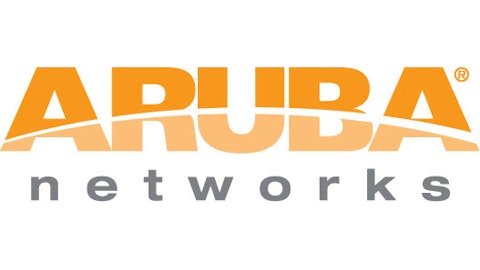On March 21 networking giant Cisco Systems, Inc. (NASDAQ:CSCO) was downgraded by FBR Capital to underperform with a price target of $17 per share. The reasons given were the standard bear argument: a weak market for networking hardware due to software-based solutions. What the report doesn’t say, however, is where in the world this $17 price target came from. Is it based on actual fundamentals and analysis or, more likely, the fact that Cisco Systems, Inc. (NASDAQ:CSCO) is trading near its 52-week high?

In other Cisco news, the company announced a 21% dividend increase on March 29, raising the quarterly dividend from $0.14 per share to $0.17 per share. This puts the dividend yield at about 3.25%. This dividend increase, occurring less than a year after a previous 75% dividend hike, shows that the company is committed to returning profits to shareholders.
Why $17 is a ridiculous price
Sometimes I honestly think that Wall Street analysts don’t even look at the financial statements of the companies they cover at all. First, Cisco has a whopping $5.78 per share in net cash on the balance sheet. This means that FBR is valuing all of Cisco’s future profits at about $11.22 per share. Cisco Systems, Inc. (NASDAQ:CSCO) generates about $2 per share of free cash flow annually, so apparently FBR believes that Cisco’s profits are going to decay significantly.
A quote from the analyst press release states:
We encourage investors to take profits, and we move to the sidelines as we work to better understand the significant changes occurring across the networking landscape.
In other words, they don’t know. The downgrade seems to be more of a guess than anything. Cisco, with all of its cash and a strong profit stream, can simply acquire just about any company that poses a real threat.
Part of me thinks that Cisco’s stock history over the past decade, fluctuating between $15 and $25 per share from the most part, is the main driver of this downgrade. After backing out the cash Cisco Systems, Inc. (NASDAQ:CSCO) is trading at about 7.5 times the free cash flow, which for a dominant company like Cisco seems crazy.
Returning profits to shareholders
The new dividend will require Cisco to pay out about $3.6 billion per year in dividends. This is only about a third of the company’s free cash flow, so even if profits remain flat or shrink the dividend can be raised significantly. Cisco also buys back a lot of shares, with $4.7 billion spent doing this in fiscal 2012. Some of this offsets the dilution due to stock-based compensation, but the diluted float has been reduced by 25% since 2003.
Cisco could raise the dividend by 10% per year for the next 10 years and still be paying out less than the current free cash flow.
Juniper sees downgrade as well
Along with downgrading Cisco Systems, Inc. (NASDAQ:CSCO), FBR downgraded competitor Juniper Networks, Inc. (NYSE:JNPR) as well for the same reasons. Juniper Networks, Inc. (NYSE:JNPR) is a much smaller company than Cisco, 10 times smaller by revenue, and saw its revenue and profit decline in 2012. In contrast, Cisco increased both revenue and profit in fiscal 2012, and in the quarter ending in January saw a year-on-year revenue increase of about 5%.
Juniper trades at a far higher multiple than Cisco does. 2012 was a particularly weak year, with FCF falling dramatically to $228 million. The 5-year average FCF is about $585 million, or about $1.11 per share. With about $5 per share of net cash and investments and a stock price around $18.50, the adjusted P/FCF is 12 using the 5-year figure, and about 31 using last year’s figures. By either measure Cisco is significantly less expensive. And Cisco has been able to maintain revenue growth while Juniper has not.
UBS disagrees with FBR
Another analyst, this one from UBS, put out a dissenting opinion on April 1. Stating similar reasoning as I have here, namely the large stockpile of cash and the strong free cash flow, this analyst believes that Cisco Systems, Inc. (NASDAQ:CSCO) will be able to navigate any industry transition. Along with this the price target was raised to $25 per share, a much more realistic fair value in my opinion.
The bottom line
The downgrade from FBR seems to be awfully pessimistic. Considering Cisco’s huge pile of cash, the strong cash flow, and the fact that Cisco has been able to maintain revenue growth while competitor Juniper has not leads me to believe that Cisco is in fine position to prosper. The company can make large acquisitions as needed, allowing it to take advantage of an industry transition instead of becoming a victim of one. Trading at 7.5 times the free cash flow Cisco Systems, Inc. (NASDAQ:CSCO) looks like a bargain at these prices. And at least one analyst agrees.
The article Ignore This Analyst Downgrade originally appeared on Fool.com and is written by Timothy Green.
Copyright © 1995 – 2013 The Motley Fool, LLC. All rights reserved. The Motley Fool has a disclosure policy.



